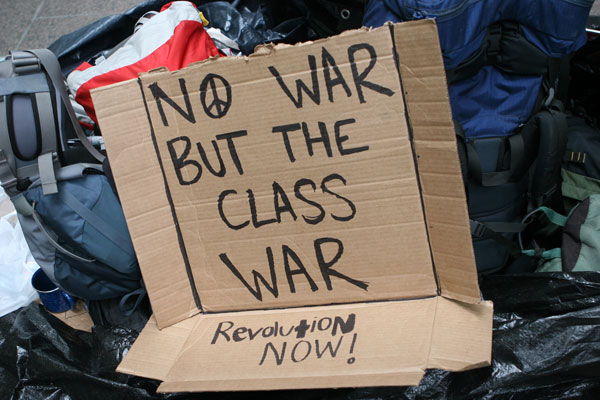
Former Washington Post reporter John Hanrahan has a long roundup of Occupy Wall Street coverage, and lack thereof, in Niemann Watchdog. Hanrahan argues that left-wing activism was promisingly, um, active last decade with the rise of the anti-war movement, which Barack Obama rode to victory, attention flagged shortly thereafter, and it's back with Occupy Wall Street and Keystone XL protests:
In the last month, street activism by progressives has shown a dramatic resurgence (a development that, as usual, has not yet been fully grasped by the mainstream press) – kicked off with two weeks of sit-ins outside the White House that produced 1,252 arrests of opponents of the 1,700-mile Alberta-to-Texas-Gulf of Mexico, environment-threatening Keystone XL tar sands oil pipeline. That was followed by the ongoing demonstrations and anti-corporate “occupation” by hundreds of mainly young people of a park near Wall Street, in a protest of big bankers’ greed and grim job prospects, that began somewhat haphazardly on September 17.
I'm not sure that's entirely true; Betsy Reed makes a good point in The Nation that there have been substantial—and fairly specifically focused—protests since Obama's election that have largely been met with shrugs by the media:
[C]onsider another very well thought-out mass action in the age of Obama: the “One Nation Working Together for Jobs, Justice and Education” mobilization, which brought throngs of protesters to Washington, DC, on October 2, 2010. Garnering a turnout organizers estimated at 175,000, the march won endorsements from 400 groups…. In terms of media impact, One Nation was almost entirely eclipsed by both Glenn Beck’s rage fest a month prior and Jon Stewart and Stephen Colbert’s jokey “Rally to Restore Sanity and/or Fear” later the same month.
But Hanrahan flags an interesting study published earlier this year by Michael Heaney of the University of Michigan and Fabio Rojas of Indiana University, "The Partisan Dynamics of Contention: Demobilization of the Antiwar Movement in the United States, 2007-2009":
Their study found that the withdrawal of Democratic activists changed the character of the antiwar movement by undermining broad coalitions in the movement and encouraging the formation of smaller, more radical coalitions.
After Obama's election as president, Democratic participation in antiwar activities plunged, falling from 37 percent in January 2009 to a low of 19 percent in November 2009, Heaney and Rojas say. In contrast, members of third parties became proportionately more prevalent in the movement, rising from 16 percent in January 2009 to a high of 34 percent in November 2009.
It's a compelling—if not surprising in its conclusions—study:
The antiwar movement helped to demonstrate grassroots support for a key party issue and the party helped to provide activists, resources, and legitimacy for the movement. By early 2009, however, it was abundantly clear that Democrats were no longer interested in this alliance. Abandonment by the Democrats gave the movement the independence it desired, but also stripped it of its capacity for political
influence. While Obama’s election was heralded as a victory for the antiwar movement, Obama’s election, in fact, thwarted the ability of the movement to achieve critical mass.
It reminds me a bit of the idea that Barry Goldwater's resounding defeat in 19648 counterintuitively allowed the new conservatism he represented to flourish outside the spotlight. Early on it seems that Occupy Wall Street has no interest in joining with the Democratic Party or any other one, as suggested by their amusingly blunt message to MoveOn (via Glenn Greenwald).
Photograph: pweiskel08 (CC by 2.0)


